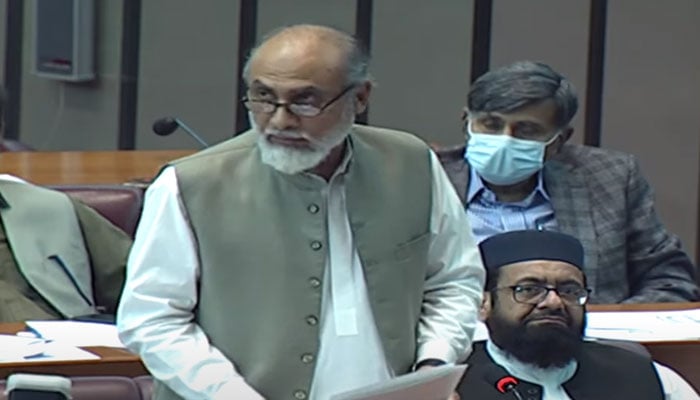NA resolution snubs SC order on Punjab polls, 'binds' PM to reject 'minority' decision
Resolution, moved by Balochistan Awami Party lawmaker Khalid Magsi, passed by lower house with majority vote
The National Assembly on Thursday passed a resolution to reject the decision of the three-member bench of the Supreme Court (SC) — which had instructed the Election Commission of Pakistan (ECP) to conduct snap polls in the country.
Moved by Balochistan Awami Party (BAP) lawmaker Khalid Magsi and approved by a majority of the lawmakers, the resolution "bound" Prime Minister Shehbaz Sharif and his cabinet to ensure that the "unconstitutional" decision was not implemented.
It noted that the National Assembly on March 28 in a resolution had called on the Supreme Court to avoid "interfering" in political matters. It also observed that multiple sections of the society had repeatedly urged the apex court to form a full court bench but their calls were ignored and only one political party was heard in the case.
“Completely ignoring the clear resolution of the Parliament and the majority decision of the four judges of the Supreme Court, the three-member special bench enforced a minority opinion, which is a violation of the traditions, precedents and procedures of the Supreme Court,” noted the resolution. It added that a minority was imposed on the majority.
The resolution also expressed concerns over the Supreme Court’s circular setting aside the verdict of a three-member bench on suo motu cases. It also raised alarms over the formation of a controversial bench and its decision to quickly close the case that prompted Justice Qazi Faez Isa to suspend “suo motu” hearings.
The lower house of Parliament also aired fears over the “undue judicial interference in political matters”. It also pointed out that the “minority ruling” had given rise to political instability and paved the way for divisions in the federal units.
“This House considers the holding of general elections at the same time throughout the country as per the prevailing procedure mentioned in the constitution and law for political and economic stability in the country as the solution to all the problems,” noted the resolution.
The resolution also demanded the formation of a full court to review the “wrong interpretation” of Article 63-A.
'Collective contempt of court'
Pakistan Tehreek-e-Insaf (PTI) lawmaker Mohsin Leghari, while opposing the resolution, warned that the House was treading on a dangerous path, and asked: “Are we committing contempt of court?”
“The Constitution prohibits speaking against the judiciary in the House,” the PTI leader maintained. He added that in passing the resolution, the House was “collectively committing contempt of court.”
He further warned that a “war” with the Supreme Court would be “very dangerous” and said that a resolution, such as the one tabled should be passed after rational consideration and not under the flow of passion.
He defended the SC’s move on the Punjab elections and said that the apex court had announced for elections to be held within 90 days since that was instructed by the Constitution, and expressed concern that 90% of the actions of the House were based on criticising PTI Chairman Imran Khan.
“Even though Imran is not in the House, he is on everyone’s minds” Legahri declared, as other members of PTI protested against the resolution.
He further took issue with the “fact” that the before carrying out a vote, the PTI was not given an opportunity to speak and present its case.
“Even when the opposition is opposed, it is given an opportunity to speak,” Leghari said.
“My daughter used to have pretend tea parties when she was younger. Of course, there wasn’t any actual food, but we went through the motions and pretended. similarly, we should at least be allowed to go through the motions of democracy and be permitted to speak.”
'We were not heard'
Following Legahri, Federal Minister for Communication and Postal Services Asad Mahmood shared his opinion.
“I condemn the atrocities faced by worshipers in Al-Aqsa Mosque,” he said, adding that the rulers of Muslim nations across the world should speak up against Israeli oppression.
He then underscored the apparent gravity of the political situation in the country, saying: “Just as Kashmiris are fighting for their rights in Kashmir, Pakistan’s parliament is fighting for its rights.”
He further alleged that the court was not paying heed to the “political representative” of the country.
“We were not made a party in the court; we were not heard,” he said. “These decisions are being made in someone's love.”
He asked how the house could be expected to accept the decision of the apex court when its members were not being heard.
“We are not saying that decisions should be made according to our will,” Mahmood clarified. “However, it seems that the judges are taking up the roles of the ECP and parliament as well.”
Attacking the judiciary for allegedly taking sides and being impartial, the federal minister argued that the formation of a full bench would have been better.
“If a full court had been decided, this resolution would not have been passed today,” he said declaring that the government did not have time to engage with the judiciary in this manner.
“Should we fix the economy of this country or play court with you?” he asked.
-
Security forces gun down 30 terrorists in multiple IBOs in KP: ISPR
-
MQM-P calls for new province in Sindh
-
US report validates Pakistan military edge over India: PM
-
Banned TTP poses serious threat to Pakistan security: UNSC panel
-
CM Afridi clarifies remarks on by-poll after ECP requests army deployment
-
Dubai sees 3.2m Pakistani passengers in 2025 as airport sets new milestone
-
Security forces kill 23 Indian proxy terrorists in KP's Kurram
-
Pakistan to construct island to boost oil exploration: report












